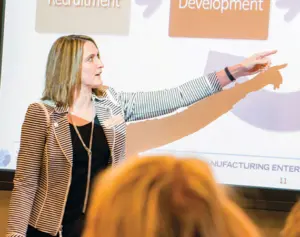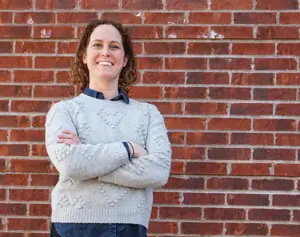Rachel Johnson was named president and CEO of the Area Partnership for Economic Expansion (APEX), serving Northeast Minnesota and Northwest Wisconsin, in August 2022. Johnson earned a bachelor’s degree in management from the College of St. Scholastica and went on to hold multiple leadership roles in commercial real estate, permitting, the energy sector and stakeholder communications. She lives in Duluth, where she serves on the Chamber of Commerce, Better In Our Backyard and the YMCA Heritage Foundation.
What is APEX and what drew you to the organization?
Rachel: APEX was founded almost 20 years ago here in Duluth to serve a 10-county region in Minnesota and Wisconsin. It’s about the size of West Virginia, and APEX takes a regional approach. We’re all in the same economic development eco-system, working together collaboratively, recognizing that when something happens in Duluth, like a new manufacturer setting up shop, it affects the Iron Range and vice-versa. So, initially APEX was formed because there was this recognition that we couldn’t just rely on the government for economic development programming. Why not leverage the know-how, expertise and drive of the private sector to problem solve and attract, expand, and retain business in our region?
I grew up on the North Shore in Knife River and left for college and moved down to the Twin Cities for a time, thinking that’s where I needed to go for a successful career with opportunities. But I quickly made my way back to the Northland because of this beautiful view of Lake Superior [gesturing out her downtown office window]. Everything led me back to trying to make an impact in my community and my region. I’ve got a lot of pride and sense of ownership in this place. When this opportunity to lead APEX became available, it was such a nice culmination of so many things that I had done, my interest in doing something bigger than myself, and working with others who also had the energy, enthusiasm, and belief that we can truly have a special place here for future generations to thrive.
What are some of APEX’s successes?
Rachel: It was before my time, but I think of the Involta Data Center and the AAR aircraft maintenance base that now Cirrus Aircraft has acquired to develop into its innovation center. Those are two top-of-mind examples, in terms of attracting business in the case of Involta, and expansion and continued innovation of an existing business in the case of Cirrus.
When I met with Cirrus, one of our investor members, they announced their innovation center and their plan to hire 160 employees. But they have been having a hard time recruiting. For example, they’ve had 35 recruits over the past year who accepted a job but ended up backing out because they couldn’t find suitable housing. So, I made a commitment to do something about it. We invited developers, financers, builders and municipalities to get together in the same room, so they could hear from Cirrus about the challenges they face and understand what the demographics of their employees were, in terms of what kinds of homes or rentals they could afford. That was a huge catalyst.
Coming into this job I wouldn’t have thought we would be focused on housing. But it makes perfect sense, because our three main objectives are attraction, expansion, and retention of business. And retention is a lot easier than attraction.
What are some of APEX’s other significant challenges?
Rachel: We see the permitting process in our state as lengthy, unpredictable, and not very transparent. We are working with the Minnesota Chamber Foundation, which is conducting a permitting study to uncover impediments and areas where we can improve to attract businesses and industries to our state. When they look at our track record, it becomes a perceived barrier to come to our state and particularly to our region.
We have such a wealth of natural resources, but there are groups concerned about the environmental impacts of extracting those critical minerals. So, we’ve got this lock-up of values and philosophies. But what I find is, at the core, we share common ground, because we all appreciate and want to protect this beautiful place we live in. Yet, there’s an opportunity to meet the demands of our state and the nation for critical minerals that go into things like electric vehicle batteries, solar panels and some of the growing needs of our green energy economy. That’s one of the foundational things I’m working on at APEX. How do we work to find that common ground, so we can use some of these critical resources in a responsible way to meet the demands of our economy? I’m trying to restart that conversation, because I think our natural resource-based economy is a huge key to our state’s success.
Is the region able to hold onto talent, or are young people often of the opinion that they need to move away to find success?
Rachel: There is still that perception. But I think there’s an opportunity for employers and educators to sync up and better articulate the opportunities in our own back yard, because almost every single company I talk to is challenged by the workforce shortage and the availability of good employees, especially when a lot of companies have an aging workforce and they’re concerned about creating the pathways and the pipelines for new employees to get into their industry. There was a lot pressure in the past for young people to get a liberal arts degree, but what I see now is a huge shift in that mentality, where people recognize we’re really in desperate need of folks who have technical skills. It’s a huge opportunity, too, because young people can get into some of these careers in the trades and manufacturing with much less expense or debt. We do a manufacturers’ tour with high school students and employers in the region, from Two Harbors to Duluth to Fond du Lac, where young people can see first-hand what the facilities look like and the job opportunities that are available. That has been such a huge eye-opening experience for them.



